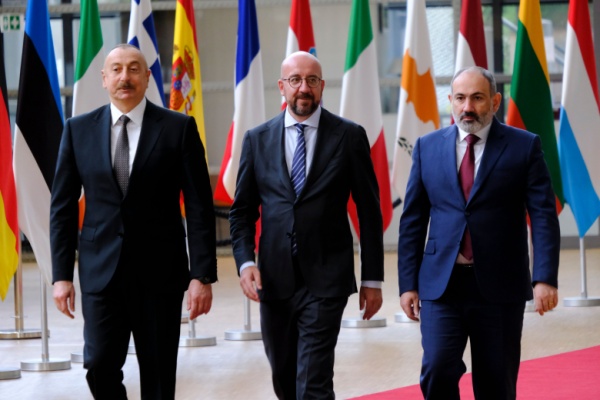India, Pakistan, and the South Caucasus Arms Race
By Syed Fazl-e-Haider
Pakistan and India, the longstanding rivals in South Asia, have instigated an arms race in the South Caucasus region. This development comes amid a broader arms supply deficit caused by Russia's preoccupation with the ongoing conflict in Ukraine. While India is deepening its military partnership with Armenia, Pakistan is enhancing the defense capabilities of Azerbaijan. Both states are actively seeking to fill the vacuum in arms procurement left by Russia's reduced presence in the region. India has aligned with Armenia, leveraging this partnership to pursue strategic connectivity projects in the South Caucasus. Conversely, Pakistan views Azerbaijan as a strategic ally, with their collaboration deemed essential for countering India in the competition for regional influence.
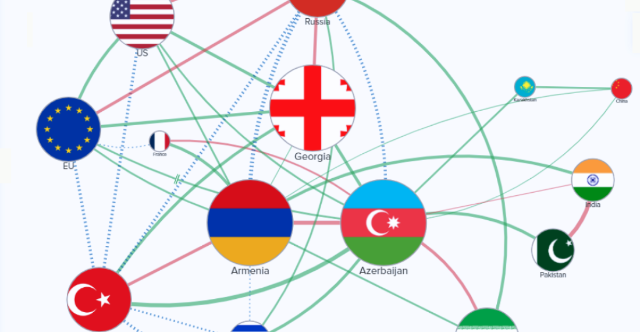
BCKGROUND: India and Pakistan have shared a contentious relationship since their emergence as independent states in 1947. The two states have engaged in three full-scale wars, primarily over Kashmir, a territory claimed by both. In 1998, Pakistan conducted nuclear tests shortly after India, marking a significant escalation in their rivalry. This ongoing antagonism often manifests in international forums, where the two countries accuse each other of fostering cross-border terrorism. Their rivalry extended to the South Caucasus in 2020, during the 44-day war between Armenia and Azerbaijan over the disputed Nagorno-Karabakh region.
Pakistan supported Azerbaijan during the Second Karabakh War in 2020. However, the close relationship between the two countries predates this conflict, with their cordial ties dating back to Azerbaijan's independence in 1991, following the dissolution of the Soviet Union. Pakistan was among the first nations to recognize Azerbaijan's independence, second only to Türkiye. After Armenian forces attacked Azerbaijan's Nagorno-Karabakh region shortly after its independence, both Türkiye and Pakistan strongly condemned Armenia's actions. Since then, they have consistently supported Azerbaijan’s position on the Nagorno-Karabakh issue in international forums, both politically and diplomatically. Pakistan has gone so far as to refrain from recognizing Armenia, refusing to establish diplomatic relations with the country. In return, Azerbaijan has endorsed Pakistan’s stance on the Kashmir dispute, a position that has antagonized India.
During the Second Karabakh War in 2020, Islamabad was alleged to have sent military advisers to support Azerbaijan. Armenian Prime Minister Nikol Pashinyan even claimed that Pakistani soldiers were actively fighting alongside the Azerbaijani army against Armenia during the 44-day conflict over Nagorno-Karabakh. Pakistan, however, categorically dismissed these allegations, labeling them as "baseless and unwarranted." Ultimately, Azerbaijan emerged victorious in the six-week war over the disputed region.
Türkiye strongly backed Pakistan's position on Kashmir, reciprocating Pakistan’s unequivocal support for Azerbaijan during the Karabakh war. The mutual endorsements of Islamabad's stance on Kashmir by Ankara and Baku provoked concern in New Delhi. Pakistan’s support for Azerbaijan during the conflict played a pivotal role in fostering closer ties between India and Armenia in the aftermath of the war. Observing its rival’s activities during the Karabakh conflict, India responded by significantly enhancing its defense partnership with Armenia over the subsequent four years.
Meanwhile, Azerbaijan, Pakistan, and Türkiye formalized their alliance by signing the Trilateral Islamabad Declaration in 2021, underscoring their solidarity with Azerbaijan in the aftermath of the war.
IMPLICATIONS: The supply of military equipment by India and Pakistan has significantly reduced Azerbaijan's and Armenia's dependence on Russia for weapons and ammunition. Historically, both South Caucasian nations relied heavily on Russia for defense supplies, particularly in the period preceding the 2020 Karabakh War. Between 2011 and 2020, Russia accounted for 94 percent of Armenia's major arms imports, including armored personnel carriers, air defense systems, multiple rocket launchers, and tanks. Similarly, Azerbaijan depended extensively on Russian military supplies during the same period, purchasing armored vehicles, air defense systems, Smerch rockets, transport and combat helicopters, artillery, multiple rocket launchers, and tanks.
India considers Armenia a strategic partner in the South Caucasus and has consequently deepened its military ties with Yerevan. Armenia has emerged as the largest foreign recipient of Indian weapons, with defense contracts concluded since 2020 estimated at US$ 2 billion. According to a report by the Indian Ministry of Finance, Armenia has become the leading importer of Indian arms, securing deals for the purchase of Pinaka multiple-launch rocket systems and Akash anti-aircraft systems. This development reflects a significant realignment in the defense landscape of the region.
In September, Azerbaijan formally introduced Pakistan’s fourth-generation JF-17 Thunder Block III fighter jets to its air force, marking a significant milestone in defense cooperation between the two nations. This development followed a US$ 1.6 billion agreement signed in February for the acquisition of JF-17 Block III aircraft. The deal includes not only the supply of aircraft but also ammunition and pilot training provided by Pakistan. The advanced combat capabilities of the JF-17 Block III are expected to enhance Azerbaijan's military edge in the South Caucasus. Notably, Azerbaijan has requested 60 JF-17 jets, intended to replace its entire fleet of aircraft, making this the largest defense export deal in Pakistan’s history.
The defense agreements between India and Armenia, as well as those between Pakistan and Azerbaijan, have significantly diminished Russia’s position as the principal supplier of weapons and ammunition to the South Caucasian nations. This shift has been exacerbated by Russia’s ongoing war in Ukraine, which has undermined its ability to deliver weapons in a timely manner under previously signed contracts. The entry of India and Pakistan into the regional defense market has provided Armenia and Azerbaijan with an opportunity to diversify their military procurement, reducing their historical reliance on Russian defense supplies.
The entry of India and Pakistan into the South Caucasus has resulted in the formation of two rival blocs competing for regional influence. One alliance, referred to as the Three Brothers, comprises Azerbaijan, Türkiye, and Pakistan, while the opposing group includes Armenia, Iran, France, and India.
For India, Armenia holds strategic importance as a potential bridge to access the vast market of the Eurasian Economic Union (EAEU). New Delhi views Armenia as a vital transit hub for connecting Indian goods to EU countries and envisions its role in facilitating bilateral or multilateral partnerships with nations such as Iran, France, and Greece to implement strategic connectivity projects in the South Caucasus.
Conversely, Islamabad considers its partnership with Azerbaijan critical for countering India's influence in the region. Azerbaijan has also emerged as a key player in the energy transit corridors connecting the Black Sea, South Caucasus, and Europe, further enhancing its geopolitical significance. This dynamic positions Azerbaijan as a strategic ally for Pakistan, particularly in the context of their shared interests in limiting India's regional ambitions.
CONCLUSIONS: Pakistan's defense cooperation with Azerbaijan and India's arms sales to Armenia are shaping new security dynamics that link the South Caucasus and South Asia. The extensive defense contracts between India and Armenia are poised to strengthen Armenia's position as a strategic ally for India in the region.
India's military partnership with Armenia is influenced by its geopolitical rivalry with Pakistan, which is actively supporting Azerbaijan's defense capabilities. Both Pakistan and India aim to secure reciprocal cooperation from the South Caucasian nations to advance their strategic interests. For Pakistan, Azerbaijan holds particular importance as a potential partner in trans-regional energy cooperation, given Pakistan's energy deficiencies. Azerbaijan's pivotal role in the energy transit corridor connecting South Asia and the South Caucasus further underscores this strategic alignment.
Conversely, India, as an observer in the Eurasian Economic Union (EAEU), is working to deepen its cooperation with Armenia across economic sectors, with a particular emphasis on defense. Armenia's strategic position could also facilitate India's broader connectivity initiatives with Europe. Meanwhile, Pakistan is likely to leverage its relationship with Azerbaijan to counterbalance India's growing influence in the region, highlighting the interconnected and competitive geopolitical landscape of the South Caucasus and South Asia.
AUTHOR’S BIO: Syed Fazl-e-Haider is a Karachi-based analyst of the Wikistrat. He is a freelance columnist and the author of several books. He has contributed articles and analysis to a range of publications. He is a regular contributor to Eurasia Daily Monitor of Jamestown Foundation.
What Does Russia's Attempted Coup In Armenia Mean?
By Stephen Blank
On September 18, 2024, Armenian authorities announced the exposure of an attempted coup orchestrated by Russia. Seven individuals were arrested, all of whom had been recruited, trained at a Russian military base, and financially supported by Russian officials. This recent incident sheds important light on Russia’s broader relations with its neighboring countries, extending beyond the Caucasus. Moscow seems to perceive most, if not all, post-Soviet states as susceptible to such destabilization. Although Armenia’s situation is shaped by its specific relationship with Russia, it may not be as exceptional as it initially appears.
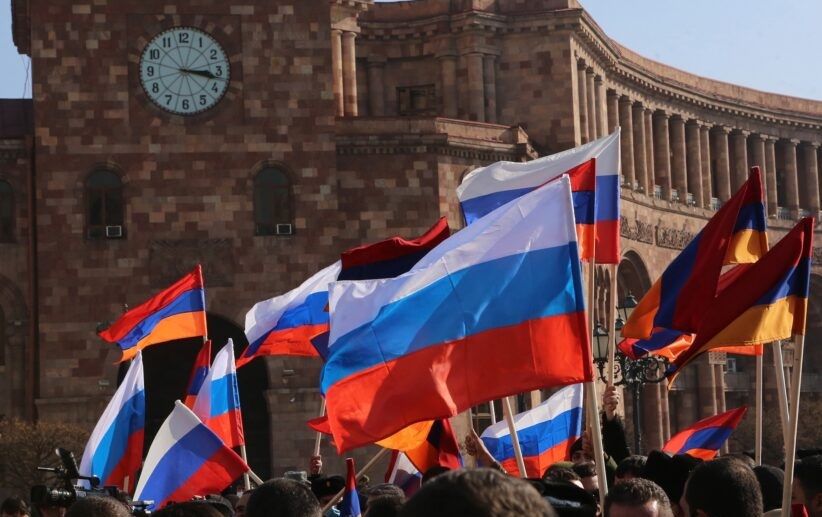
BACKGROUND: Coups have become a central tactic of the Russian state, both within the former Soviet Union and internationally. Through the use of proxies and pro-Moscow elements, Russia has been implicated in coup attempts across the Balkans, including in Montenegro, the Republic of North Macedonia, Bulgaria, Moldova, and Greece. In Ukraine in 2004, pro-Russian actors poisoned Viktor Yushchenko during his presidential campaign. Additionally, Russia has employed proxies to further its interests in Georgia. Given the presence of Russian proxies, covert operatives, and pro-Russian factions across the states of the former Soviet Union, coupled with the overarching aim of restoring the Russian empire that drives Putin’s foreign policy, it is unsurprising that Moscow frequently resorts to organized strategies of state subversion, including coups. Armenia’s increasingly strained relationship with Russia stems from two key, interconnected events: the rise of the Pashinyan government during the 2018 revolution, which itself was a response to an attempt to manipulate the elections, and Armenia’s defeat in the 2020 Nagorno-Karabakh war against Azerbaijan. The 2018 revolution brought a democratizing agenda to Armenia, creating immediate friction with Russia, as Pashinyan’s government fundamentally contradicted the authoritarian model championed by Putin’s regime. Despite these tensions, Armenia’s reliance on Russian energy and security, along with the presence of a Russian military base in Gyumri and Armenia’s efforts to maintain control over Nagorno-Karabakh, allowed for a functional, if strained, partnership between the two nations. However, the September 2020 war, which resulted in a decisive Azerbaijani victory, severely disrupted this relationship. During the conflict, Moscow did not offer military support to Armenia, while Turkey actively aided Azerbaijan and solidified an alliance with it. Russia’s primary focus was on securing its strategic interests, positioning its troops as peacekeepers between the warring sides after the fighting concluded, rather than directly assisting Armenia. This outcome has severely undermined the Armenia-Russia partnership, potentially beyond repair. As a result of Russia’s perceived “betrayal” and self-serving policies during the Nagorno-Karabakh conflict, Armenian support for its alliance with Russia has steadily eroded. The Pashinyan government, despite facing nationalist opposition domestically, has largely accepted defeat in Nagorno-Karabakh, relinquishing claims to the region, although the issue of a corridor connecting Azerbaijan to its Nakhichevan exclave remains unresolved. Armenia’s growing discontent with Russia has manifested in its de facto withdrawal from the Collective Security Treaty Organization (CSTO), Moscow’s attempt to create a defense alliance with intervention rights across the former Soviet Union. From Putin’s perspective, this shift is particularly alarming. Armenia has not only distanced itself from Russia but has also strengthened its ties with the U.S. and the EU, seeking economic assistance and exploring the possibility of acquiring Western (notably French) weapons. These actions jeopardize Armenia’s dependence on Russia and feed into Moscow’s persistent fear of Western influence in the strategically critical Caucasus region. In response, it is predictable that Russia would view Armenia’s pro-Western trajectory as a direct threat and seek to replace the Pashinyan government with a more compliant regime, one that would restore Yerevan’s subservience to Moscow’s geopolitical objectives. Simultaneously Russia has reversed its alliances, positioning itself as a partner of Azerbaijan, a sentiment that Azerbaijan reciprocates.
IMPLICATIONS: Given Russia’s continued military presence at its base in Gyumri and its broader leverage over Armenia, this is likely the most favorable arrangement Russia can achieve in the current geopolitical landscape of the Caucasus. When considered alongside the strong position of the increasingly pro-Russian Georgian Dream party, this alignment enhances Russia’s strategic hold in the region. However, these maneuvers leave Armenia in a precarious position. Despite its vulnerability, domestic public and elite opinion in Armenia is unlikely to support a return to dependence on Russia. Yet, the coup attempt reveals that even this seemingly optimal arrangement is insufficient for Moscow, which remains dissatisfied as long as Pashinyan’s government stays in power. Consequently, Russia sought to overthrow Pashinyan’s administration and install a regime more amenable to its interests. Russia’s coup attempt is driven by its desire to reassert itself as the dominant power over the three Transcaucasian states and reclaim its strategic advantage against regional rivals – namely Iran, Turkey, and the West. Moscow’s bid for control continues to shape its foreign policy not only in the Caucasus but also in its actions across the broader former Soviet space, as seen in its involvement in Ukraine and Central Asia. The potential rise of Armenian nationalists, who may be unreconciled to the losses in Nagorno-Karabakh, does not seem to alarm Moscow. On the contrary, Russia likely calculates that by fostering an unresolved conflict between Armenia and Azerbaijan, it could restore its influence in the region. Perpetual instability would create a need for an external “security manager” – a role Russia would readily assume. Additionally, such a situation would undermine Western influence and its democratizing efforts in the region, allowing Russia to discredit and push out Western agendas. This would enable Moscow to recover as much of its former dominance in the region as is realistically feasible. The attempted coup in Armenia highlights several implications for both Russia and its neighboring states, as well as for other European states, such as those in the Balkans. It exposes the failure of Russia’s policies toward Armenia, demonstrating that Moscow is unable to provide security to its allies despite formal agreements. Additionally, Russia’s capacity to offer economic support has significantly diminished under the weight of international sanctions and the specter of stagflation. This decline is not limited to Armenia but is also visible in Central Asia, where Russia, despite holding significant economic sway, is increasingly unable to compete with foreign rivals. Moscow’s self-proclaimed role as the primary security provider in Central Asia has been undermined, particularly following its invasion of Ukraine. Notably, no Central Asian state has endorsed Russia’s actions, and Kazakhstan has publicly distanced itself from Moscow’s goals, recognizing the implications for its own sovereignty, especially given the claims by Russian revisionists that northern Kazakhstan should be considered part of Russia. This broader regional disengagement reflects a weakening of Russia’s influence, as its inability to fulfill its security commitments and its shrinking economic capacity force its neighbors to seek alternatives. The coup attempt in Armenia, therefore, is symptomatic of a larger strategic failure that underscores Russia’s declining power and the increasingly fragile nature of its imperial reach across the former Soviet Union and beyond.
CONCLUSIONS: Russia’s failure to deliver on its security promises, alongside its visibly declining economy, has paved the way for Central Asian states to pursue both greater regional cooperation and increased foreign engagement. These developments are perceived by Moscow as threatening, as they represent a shift away from Russian influence. The Armenian case exemplifies Russia’s inability to effectively wield its instruments of power in former Soviet republics, leaving it increasingly reliant on force and deceit to maintain control. Coups, such as those attempted in the Balkans and now Armenia, along with heightened espionage and sabotage efforts across Europe, have become the primary mechanisms through which Russia conducts its foreign policy. This dynamic threatens Europe and as seen in Armenia, also places the Caucasus and Central Asia under constant risk of destabilization. Putin’s regime depends on the systematic use of coercion and manipulation to survive. This reliance renders it a persistent threat to every European and post-Soviet government, from London to Dushanbe. The attempted coup in Armenia is a clear illustration of this reality and signals that further crises are inevitable as Putin’s regime struggles to sustain the remnants of an empire. The effort to oust Pashinyan is not an isolated incident but a warning of future instability, a symptom of Russia’s inability to accept that its imperial aspirations are no longer viable. Thus, the Armenian coup is likely the first in a series of crises that will unfold across Eurasia. It serves as a stark reminder that Russia’s weakening grip on its former territories will continue to generate turbulence. We can no longer claim ignorance of these possibilities; the warning signs are clear, and we have been forewarned of what lies ahead.
AUTHOR’S BIO: Stephen Blank is a Senior Fellow at the Foreign Policy Research Institute at www.fpri.org.
Armenia's Enduring Military Dependence On Russia Resists Erosion
By Robert M. Cutler
Armenia’s military dependence on Russia has deep roots, originating in the Soviet era and solidifying after Armenia joined the Collective Security Treaty Organization (CSTO) in 1992. Russia has supplied most of Armenia’s military equipment, including during the First and Second Karabakh Wars, reinforcing Armenia’s dependence on Russian military support. Despite efforts to diversify its military relations, including with France and the European Union, Armenia remains deeply tied to Russia through extensive military, economic, and geopolitical connections. This dependence is likely to persist, shaping Armenia’s international relations and military strategies into the future.
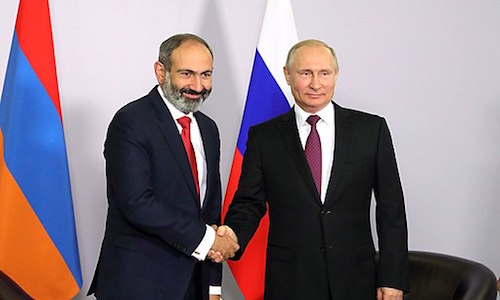
BACKGROUND: Armenia’s military dependence on Russia dates back to the collapse of the Soviet Union, under which it had the legal status of the highest-level administrative division as a “union-republic.” After 1991, the newly independent Republic of Armenia inherited Soviet-era equipment and continued to maintain close ties with Russia. Confirming its reliance on Russian military assistance, Armenia joined the Russian-led CSTO in 1992. The relationship deepened in the early 1990s, during the First Karabakh War with Azerbaijan, as Russia gave the Republic of Armenia’s army crucial military support to consolidate its advances on occupied Azerbaijani territory. Since then, Russia has provided Armenia with most of its military equipment, as well as significant financial aid and logistical assistance. Between 2011 and 2020, Russia was the primary source of Armenia’s military supplies. The Stockholm International Peace Research Institute reported that Russia provided no less than 94 percent of Armenia’s arms imports during this period. Armored personnel carriers, air defense systems, multiple rocket launchers, and tanks were among the weapons systems delivered. Armenia utilized all these weapons against Azerbaijan during the Second Karabakh War in late 2020. In exchange, Armenia has consistently shown strong diplomatic support for Russia on key international matters, including the illegal annexation of Crimea. Although Armenia has occasionally accused Russia of neglect, the overall evidence indicates a long-standing strategic partnership. The 1997 Treaty of Friendship, Cooperation, and Mutual Assistance between the two nations, which exists independently of their collaboration within the CSTO, officially established their military alliance. On the economic side, Armenia has been a member of the Russian-led Eurasian Economic Union (EAEU) since January 2015. Russian armed forces continue to operate the 102nd Military Base at Gyumri, first established 70 years ago. The agreement on the base’s operations has been extended multiple times. In 2010 an interstate treaty provided for its continued operation until 2044. Under the terms of the treaty, neither Armenia nor Russia can terminate the agreement by itself; both parties must agree. The Gyumri military base currently hosts 3,000 Russian soldiers, while five miles from central Yerevan – at Erebuni Airport – another air base is home to a squadron of attack helicopters. In 2019, after a 2018 meeting with Russian President Vladimir Putin, Pashinyan sent a mission to Syria, officially for humanitarian reasons, though it included military personnel. In May 2021, Pashinyan initiated two deployments from the Gyumri base into southern Armenia, specifically targeting the Syunik region. This area lies between Azerbaijan’s main territory and its exclave, Nakhchivan, and encompasses the land strip sometimes referred to as the “Zangezur corridor.”
IMPLICATIONS: Despite claims that Russia abandoned Armenia before the Second Karabakh War, evidence suggests continued support. After the July 2020 clashes that led up to the war in the fall, there were reports of nine Russian flights delivering military supplies to Armenia. This flight activity intensified as the war approached, and overall Russia transported 510 tons of war materiel to Armenia. When Azerbaijan’s President Ilham Aliyev expressed misgivings to President Vladimir Putin about these shipments, Russia’s Defense Minister Sergei Shoigu claimed that the cargo was intended for construction activities at the Gyumri base. This explanation was skeptically received in Azerbaijan, particularly after the surprise and dismay following the earlier Russian deliveries to Armenia. A significant illustration of this close military cooperation was the attendance by Armenia’s former defense minister, Arshak Karapetyan, at an August 2021 military exhibition in Moscow. Karapetyan met there Dmitry Shugayev, the Director of the Russian Federal Service for Military-Technical Cooperation, and Alexander Mikheyev, the Director of Rosoboronexport. These meetings covered the full range of Armenian-Russian military-technical cooperation, reflecting the enduring and comprehensive nature of their bilateral military alliance. In 2020, Iskander surface-to-surface missiles, with a range of 300 kilometers and forming a crucial part of Armenia’s arsenal, were reportedly used to strike Azerbaijani territory far behind the front lines during the Second Karabakh War. These missiles also targeted the historically, culturally, and strategically significant city of Shusha, which Armenian forces had occupied. Russia routinely sells its military systems to Armenia at the domestic Russian price, rather than at the higher international price set for foreign buyers. To facilitate this, Moscow generally offers low-interest loans to Yerevan. Since 2020, it has provided at least US$ 300 million in such loans to help Armenia replenish its military arsenal. Discussions are continually ongoing to increase this amount further. Moreover, the Russian FSB’s Border Guard Service is responsible for overseeing most of Armenia’s international borders. Additionally, Russia has been incorporating Armenian armed forces into its Southern Military District. This reorganization includes the creation of joint Russian-Armenian ground forces. The air defense systems of the two countries have been unified for some time. Russia is responsible for maintaining the security of Armenian airspace. Armenia’s relationship with Russia has only deepened over the past three decades. Its dependence extends far beyond its involvement in the CSTO and EAEU and its comprehensive bilateral treaty. Russian state companies have a significant presence across the Armenian economy. They control important sectors such as transportation, where the Armenian state railroad company is entirely owned by its Russian counterpart; the energy sector, where one Russian state trust owns Armenia’s gas distribution system and another oversees the Metsamor nuclear power plant; and the banking sector, where Russian financial institutions are overwhelmingly dominant.
CONCLUSIONS: Armenia appears to be exploring options to decrease its reliance Russian military support and modernize its forces, but its strategic partnership with Russia is a cornerstone of the country’s post-Soviet identity. The partnership, marked by extensive military collaboration, geopolitical alignment, and economic and security dependence, plays a crucial role in shaping Armenia’s international relations and military strategy, despite signs that Yerevan is seeking to diversify its alliances and broaden its strategic options. Thus, despite receiving the European Union Mission in Armenia (EUMA) to monitor the border situation, and despite signing an arms deal with France to acquire radar systems and other equipment from French manufacturers Thales and Safran, Armenia’s strategic choices have placed it firmly under Russian dominance. Efforts by the EU and its members, particularly France, to extend their influence in Armenia for their own purposes, have not diminished Yerevan’s subservience to Moscow, which – as described above – influences almost every facet of the country’s life. Even the declared intention to leave the CSTO at some indefinite time in the future will not affect the bilateral military treaty with Russia that will remain in force, until 2044 unless both sides agree to abandon it. France and other powers, including the U.S., should focus on Armenia’s genuine security concerns rather than exploiting it for geopolitical purposes. Unfortunately their current strategies, often driven by radical irredentist Armenian interest groups that continue to focus on Karabakh, often exacerbate divisions in the South Caucasus rather than bring stability. But using Armenia and its conflict with Azerbaijan to further their own strategic interests will only fuel ongoing conflict and deepen mistrust, jeopardizing Armenia’s long-term security and diminishing the chances for lasting peace in the region.
AUTHOR’S BIO: Robert M. Cutler was for many years a senior researcher at the Institute of European, Russian and Eurasian Studies, Carleton University, and is a past Fellow of the Canadian International Council.
India-Pakistan Strategic Rivalry Extends to the South Caucasus
By Vali Kaleji
March 28, 2024
The development of military and defense relations between Azerbaijan and Pakistan and Armenia and India is an important consequence of the political arrangement and the balance of forces after the Second Karabakh War. However, Pakistan’s non-recognition of Israel has prevented Baku from forming a “quadruple alliance” with its three strategic allies, including Turkey, Israel and Pakistan. Armenia, after defeat in the war and amid dissatisfaction with its traditional ally Russia and the Collective Security Treaty Organization (CSTO), views India, France and Iran as new strategic options, however, Iran prefers Armenia to maintain its traditional and strategic relations with Russia. The tripartite cooperation between Armenia, Iran and India focus efforts on “soft balancing” (economic-transit) instead of “hard balancing” (military-security), against the tripartite ties of Azerbaijan, Turkey and Pakistan in the South Caucasus.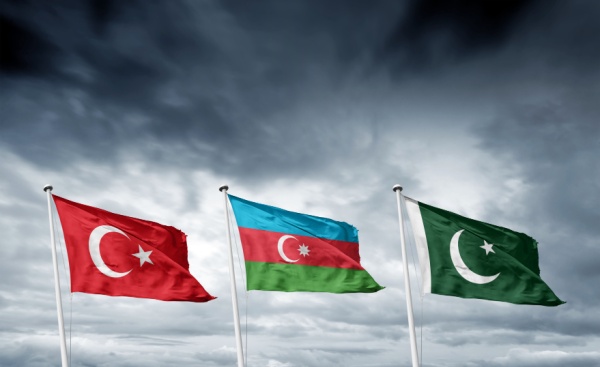
Armenia and Azerbaijan: The Distant Perspective of Peace, Cooperation and Narratives of Trust
By Intigam Mamedov
March 21, 2024
On February 13, 2024, a new border skirmish took place between Armenia and Azerbaijan, months after Baku regained its territories in Nagorno-Karabakh. While the sides accuse each other of provocations, such incidents could also lead to larger clashes. While a peace deal is needed in order to put an end to the decades-long conflict, reaching an agreement will take time. Meanwhile, to encourage it, both states should now focus on trust-building initiatives, particularly in the humanitarian, economic, and environmental areas. Such short-term initiatives have the potential to assist and stimulate the evolution of new narratives on peaceful coexistence – a challenging but vital task for current and future generations.
